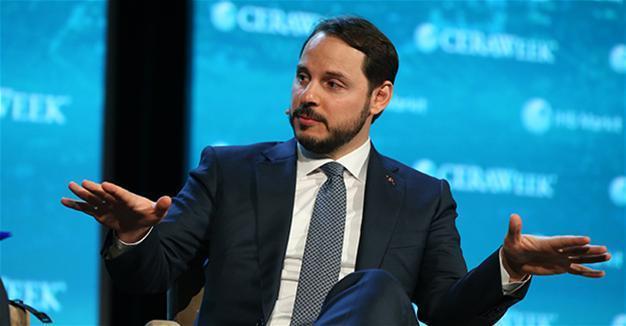Turkey prioritizes future energy diversification: Minister
HOUSTON - Anadolu Agency

AA photo
Turkey’s main goal in the energy sector is diversification, Energy Minister Berat Albayrak said at a conference in the U.S. on March 7.
“More than half of our electricity generation is from gas,” he said at the IHS CERAWeek energy conference in Houston, Texas.
“This can’t be sustainable, so we changed this strategy. We are aiming to diversify our natural gas portfolio in the following years,” Albayrak added.
He said Turkey invested more than $75 billion in energy in recent years.
“Total installed electricity capacity moved from approximately 30,000 megawatts in 2002 to almost 80,000 MW right now,” the minister said.
Turkey’s average annual electricity growth currently stands at more than 6 percent, making it the leading country in the Organization for Economic Cooperation and Development, Albayrak said.
The country is investing heavily in liquid natural gas and ships to transfer the fuel and has largely moved from the domestic use of coal to natural gas.
“We ended up having huge diversification in the last 10 to 15 years,” Albayrak said, referring to the gas market.
“Today, in 78 cities out of 81, we have a gas infrastructure,” he added.
Turkey consumed almost 50 billion cubic meters of natural gas last year, more than half of it from Russia.
“Instead of relying on specific sources, we are aiming at diversification right now. We need to increase supply security. This is crucial for the region and for European markets as well,” he added.
Albayrak stressed that energy projects in Turkey were crucial to regional peace and stability.
Nuclear energy ‘to be key’
“We are working toward bringing gas via pipeline from the eastern Mediterranean to Turkey’s internal market and then to European markets,” he added.
Albayrak said nuclear energy would play a significant role in energy diversification. Two nuclear plants are currently under construction at Akkuyu on the Mediterranean coast and Sinop on the Black Sea.
“Nuclear should be at least 10 percent of total electricity generation capacity,” he said.
“By 2023, the first reactor on our first nuclear plant will become operational and the second plant’s first reactor will be launched around 2025,” he added.
Turkey also has significant potential to exploit renewable energy sources.
While the cost of renewable energy has dropped significantly in recent years, Turkey’s investment has increased in these projects, the minister said.
“In 2016, we installed 1,400 megawatts in the system,” he added.
The Konya-Karapinar Renewable Energy Resources Area Project is expected to be one of the largest solar farms in the world, with a capacity of 1,000 megawatts.
“It will have a 15-year purchase guarantee without any currency risk,” Albayrak said.
“In mid-summer, we are going to launch a solar and wind tender, with an additional 1,000 megawatts each. For the next 10 years, we are aiming for at least 10,000 megawatts each for solar and wind from private business initiatives,” he said.
Albayrak also said Turkey aims to get at least two-thirds of its energy from local sources and invited investors to participate in the country’s energy sector.
